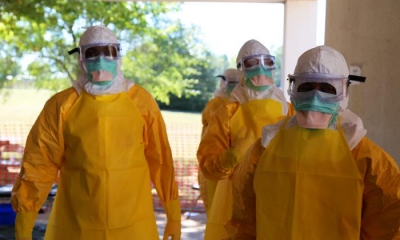 The waning number of Ebola cases is good news for West Africa, but for those developing a vaccine for the disease, it means time is running short.
The waning number of Ebola cases is good news for West Africa, but for those developing a vaccine for the disease, it means time is running short.
As the current outbreak wanes, scientists have to make the most of every opportunity to determine if an Ebola vaccine is safe and effective so that we are better prepared for future outbreaks. University of Texas at Austin researchers Steve Bellan and Lauren Meyers are helping U.S. Centers for Disease Control and Prevention (CDC) do just that, by modeling which types of trials will provide the best information.
Ebola vaccine trials are underway in Guinea and Liberia, two of the three hardest-hit countries in the ongoing epidemic, and the CDC just initiated a vaccine trial in Sierra Leone. Reporting in the April 14 edition of The Lancet Infectious Diseases, the researchers found that changing the vaccine study design from the approach originally proposed by the CDC would lead to better information about the effectiveness of the vaccine. The CDC is, in fact, now planning to use the approach recommended in the paper.
Ebola has declined at different rates throughout Sierra Leone, which could impact the findings and ethical viability of a vaccine study. Their results show that the "stepped wedge" trial design originally planned would have been less likely to provide clear information than the phased-rollout randomized controlled trial that the CDC now plans to use. It also would not have had any significant ethical advantages.
The research team includes UT Austin graduate student Spencer Fox, as well as experts from the CDC, University of Florida, Gainesville, McMaster University in Canada, Yale University, Monash University in Australia and University of California, San Francisco.

















Comments